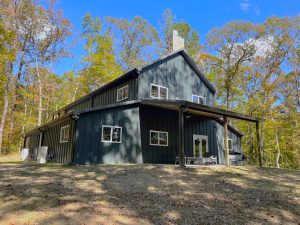VA Loans for a Pole Barn Residence
Reader MATTHEW in BIRMINGHAM writes:
“Can I use the VA loan to buy a pole barn residence?”
I reached out to Amanda (Hansen Pole Buildings’ “Wizardress of Financing”) for answers. She responded, “I honestly have no idea how VA loans work. New Century Bank (https://www.newcenturybankna.com/) may possibly offer VA loans, but they would be the only one of our lenders who does.”
Amanda posed this question of New Century Bank and they replied, “We cannot do VA new construction. As far as an already constructed home it would come down to the appraisal.”
Building your dream home is a possibility with a VA home loan. But it isn’t always an easy road.
This no-down payment program allows qualified borrowers to use their VA loan entitlement to obtain a mortgage for new construction. But it can be challenging to find lenders willing to make a true zero down VA construction loan.
VA basically insures loans, but it’s up to individual VA-approved lenders to determine what kind of loans they’ll issue. There’s a level of risk in new construction many mortgage lenders continue to shy away from.
What’s increasingly common is veterans secure a construction loan from a local lending institution. As building processes wrap up, qualified borrowers can basically turn this short-term construction loan into a permanent VA mortgage.
Getting a traditional construction loan often requires a down payment, although it may be possible to recoup this in some cases.
When it comes to looking for a construction loan, it can pay to shop around. Talk with multiple financial institutions and compare down payment requirements, closing cost estimates and more.
 There are also restrictions about using a VA loan to purchase land. Borrowers can’t use a VA loan to purchase unimproved land with a goal of one day building a home on it. There are traditional land loans for this purpose, but they typically require a down payment, too.
There are also restrictions about using a VA loan to purchase land. Borrowers can’t use a VA loan to purchase unimproved land with a goal of one day building a home on it. There are traditional land loans for this purpose, but they typically require a down payment, too.
Veterans and military members who own land they want to build on may be able to use any equity they have toward down payment requirements for construction financing.
Veterans who don’t already own land can often include this purchase in their overall construction loan.
It’s important to understand construction loans are short-term loans. This means it’s imperative for veterans and military members to start working on permanent financing as early as possible.
Lenders can take a couple different approaches to turning this short-term construction loan into a permanent VA loan. One is to issue a VA purchase loan, another is to make a VA Cash-Out refinance loan. Guidelines and policies on this can vary by lender.
VA’s Cash-Out refinance loan gives qualified veterans an opportunity to refinance their VA or non-VA loan into a lower rate mortgage and extract cash from their home’s equity. This refinance option is open to qualified homeowners with and without VA loans.
This Cash-Out shouldn’t be confused with a home equity loan (a second loan running alongside one’s current loan), or a home equity line of credit (HELOC). A VA Cash-Out refinance loan replaces your existing mortgage instead of complementing it.
Processes for obtaining a Cash-Out refinance look similar to getting a VA purchase loan, from credit benchmarks and underwriting to a VA appraisal. This refinance is the only way for VA homeowners to extract cash from equity using their VA loan benefits.
Lenders will document credit, income, employment and assets for borrowers seeking a Cash-Out refinance. Guidelines and requirements can vary by lender when it comes to things like minimum credit score, maximum debt-to-income ratio, derogatory credit and more.
Lenders may also have seasoning requirements for Cash-Out refinances. One lender’s current guideline is borrowers will need to have made seven full monthly payments on their loan being refinanced, and Cash-Out note must be at least 240 days after the original loan’s first monthly payment.
Homeowners will also need a full VA appraisal. This can include things like pest inspections, well water tests and other health, safety and marketability assessments.






